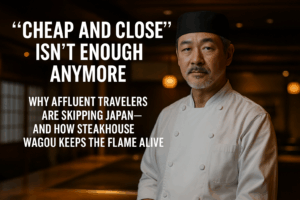Today’s Learning Blog from Steakhouse Wago
Hello everyone, this is Steakhouse Wago in Osaka.
Today, I’d like to share a story that goes beyond food — a story about people, nature, and lessons from the past.
You might have heard the word “mercury” or “the Minamata Convention.”
It sounds technical, but it’s something that affects all of us.
🐟 What Was the Minamata Disease?
More than 60 years ago, in a quiet coastal town called Minamata in Kumamoto,
many people began suffering from strange symptoms — numbness, blurred vision, difficulty speaking, and walking.
It was caused by mercury, a metal released from a factory into the sea.
Fish and shellfish absorbed it, and people who ate them became sick.
This tragedy became known as Minamata Disease,
a painful reminder of how human activity can harm both nature and ourselves.
⚙️ What Exactly Is Mercury?
Mercury is a silver-colored metal that is liquid at room temperature.
It used to be very useful — people used it in:
- thermometers
- fluorescent lamps
- dental fillings
- and even chemical factories.
But as we learned about its toxicity, countries began to phase it out for safer alternatives.
🌍 Is Mercury Still Being Used?
Unfortunately, yes.
In some parts of the world, especially in small-scale gold mining,
people still use mercury to extract gold — a method called the amalgamation process.
When they heat the mixture to separate gold, toxic mercury vapor is released into the air.
Miners and their families breathe it in,
and the remaining mercury flows into rivers, polluting fish and drinking water.
It’s a repeating story — a modern version of the same tragedy that once happened in Minamata.
🔧 Global Efforts and Japan’s Role
In 2013, the world united to say “Never again.”
That’s how the Minamata Convention on Mercury was born —
named in memory of the victims and to remind us of our responsibility.
Japan has since taken the lead, developing “mercury-free technologies.”
For example:
- LED lighting instead of mercury lamps
- digital thermometers and blood pressure monitors instead of mercury ones
- new chemical catalysts and gold extraction methods without mercury
Companies like Mitsubishi Chemical, Omron, Panasonic, and Hitachi
are helping the world move toward a safer future.
🌱 What Can We Do?
Building a mercury-free world starts with simple choices —
choosing products and actions that are kind to people and to the planet.
Here at Wago, we sometimes talk with our guests about these global issues
while watching the steak sizzle on the teppan.
Because food, too, comes from the earth — and protecting nature protects our future.
💬 Today’s Takeaway
- Minamata Disease taught us the dangers of mercury.
- Mercury is still used in small-scale gold mining.
- Japan is leading with “mercury-free” technology.
- Our everyday choices can protect the planet.
🗣️ What do you think?
If you heard this story at Wago’s counter,
would you say, “We’ve learned from the past”?
Or do you feel, “We still have work to do”?
Share your thoughts — we’d love to hear from you 🌏✨




コメント